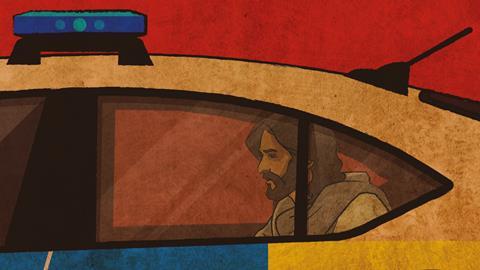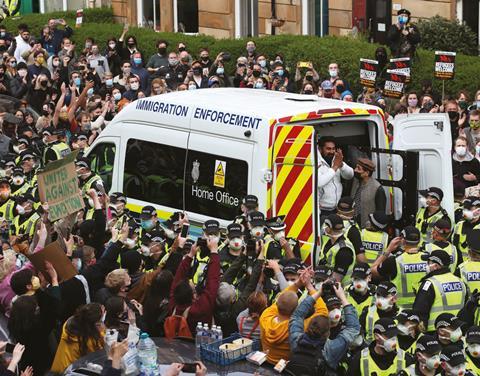
Hundreds of Glaswegians surround an immigration enforcement van, defying the authorities, demanding that the people inside be allowed to return to their homes. The crowd chants: “These are our neighbours!”
To some, it’s a scene of biblical obedience to Jesus’ message in the parable of the Good Samaritan and to God’s commands in the prophets to show grace to the stranger. To others, it’s a display of sinful rebellion against God-instituted authorities.
This fault line has deepened over a year of anti-lockdown rallies, Black Lives Matter campaigns and Extinction Rebellion demonstrations, echoing divisions over anti-war marches and anti-abortion protests that have existed for decades. It’s easy to write off a mob or dismiss a cause we disagree with. But when you meet an individual and hear what they have to say, even if it’s a view you don’t share, you have a much better chance at empathising. I often think of protestors as heroes, people doing what I’d never have the guts to do. I want to introduce you to two of them.
A TALE OF TWO HEROES
A group of people are arrested outside an arms fair. They are kneeling, singing hymns, blocking the entrance to a place where weapons will be sold to ‘countries of concern’, places that the Foreign Office cites as having dubious human rights records. When I spoke to one of the kneelers and singers, he suggested that their real crime was against music. That’s Symon (pictured below holding the Peace Pledge Union banner). He’s thoroughly nice. He tells me about the book he’s writing on the history of peace activism in Britain. He wants to call it Unarmed and Dangerous but he doesn’t think his publisher will agree to it. He says that people waiting to meet activists that get arrested outside police stations are wonderful. The best thing about them? They give you a hug and a biscuit.
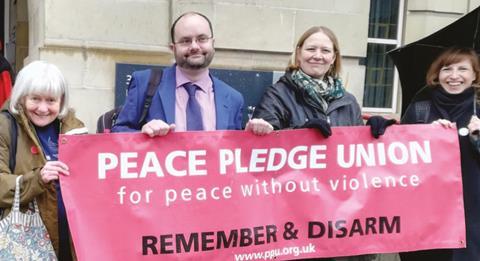
A bridge usually packed with cars is teaming with people. Extinction Rebellion has blocked the bridge and the police have been brought in to clear it. A policeman tells a vicar in a dog collar that if he arrests her, his girlfriend will never forgive him. The vicar gets arrested anyway.
Afterwards, she speaks kindly of the police. That’s Helen (pictured below, wearing the Extinction Rebellion badge). She never wanted to be in the limelight but that dog collar is a hit with photojournalists. She’s a parish priest in leafy Surrey who grew up thinking the whole of the Church was as progressive as her clergyman dad. She talks about herself as “bumbling along”, and when the subject of violence comes up, she tells me how she’s always taken the line that she’d never knock a hole in a window.
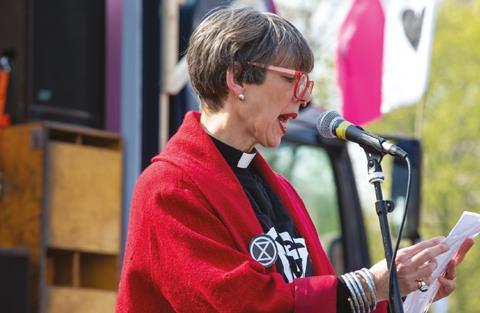
Antifa Super-Soldiers they ain’t. But even if they aren’t quite the scary image of the wild, lawless protester the media portrays, are they right? Helen Burnett and Symon Hill are activists. They’ve both been arrested and gone to court in the course of protesting for the causes they support. They’ve broken the law. Isn’t that a sin? After all, Romans 13:1-5 tells us to obey earthly authorities and their laws. Or does it? Were the people hiding Anne Frank sinning? How about Brother Andrew, who risked his life by smuggling Bibles into communist Europe? We’re pretty good at finding reasons for why breaking human laws was acceptable in the past, and we’re even better at applauding those who do it overseas. Oppressive communist or Islamic government? We suddenly discover our inner anarchist (or at least some nuance of one). But when it comes to our own culture, nation, laws and authorities, the scripture turns to stone in our hands and we often see breaking the law as automatically sinful.
IN DEFENCE OF DIRECT ACTION
But that’s not how one theologian sees it. Stanley Hauerwas was once described by Time magazine as “America’s Best Theologian (to which he responded that “‘Best’ is not a theological category”). He has written extensively about how the Church should not be conformed to worldly ideologies and has deep sympathy with those who are willing to break the law in response to overwhelming injustice.
“The Christian, at least from my reading of scripture, is always going to be possibly in tension with the societies and the law of the societies in which they find themselves,” he says. “Caesar doesn’t want you to obey God when it gets in the way of Caesar’s interests.” Thus, Hauerwas says, laughing: “We are to obey Caesar in a way that Caesar may not like.”
JESUS BROKE LAWS FREQUENTLY
That’s pretty close to how Hill sees many ‘arrestable’ direct protest actions: “We assume that if you’re arrested by the police that you’re the one doing something illegal,” he says. “But many direct activists would say in cases like that they are actually upholding the law.”
Hill tells me about the women who, in 1996, “disarmed” (for that, read: caused £1.7m of damage to) a warplane that was going to be sent to Indonesia, where it would likely have been used in attacks on East Timor civilians. Those women – at least one of whom was a committed Christian – were arrested for criminal damage but found not guilty. Their legal defence, Hill says, was not because the jury agreed with them but because what they did wasn’t actually illegal.
“If I batter my neighbour’s door down, it’s criminal damage. But if his house is on fire and I batter his door down to save him, that’s not a crime,” he says. “In much the same way as if you disarm a plane in order to prevent it bombing civilians.”
He says his reasons for blockading the DSEI London Arms Fair in 2019 were similar. “It [the arms fair] helps to sell weapons to people who use them against their own people,” he says. “If I saw somebody in the corner of my street in the dark one night selling knives to gangsters, I’d have a responsibility to do something about it.”

“My gut response to someone who says civil disobedience is always wrong would be: you haven’t experienced oppression. You don’t know what it’s like to be black, you don’t know what it’s like to be a woman, you don’t know what it’s like to be gay. You don’t know what it’s like to be completely poor, not to have an education. You’ve never understood intersectionality. Because if that had been your experience or the experience of people close to you, I think you would challenge that response. If oppression and marginalisation was your story, then your conclusion would be very different.”
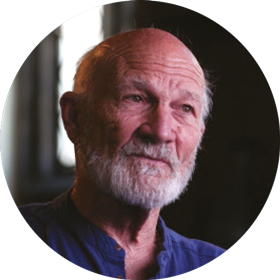
“Jesus overturning tables in the temple is often used by some Christians to justify violence. And I say that if you think turning over tables in the temple will legitimate Hiroshima and Nagasaki, you’re crazy. At most, it would justify turning over the tables at a bank. But it hardly gives you a general legitimation for violence.”

“It’s really important to recognise that not everyone can engage in direct action. People may be worried about getting a criminal record if it affects their job or increases their chances of being deported. The last thing I’m saying is that everyone should go and do direct action. A lot of people do things which are just as worthwhile and just as important. There are people who sit for ages stuffing leaflets into envelopes. They get little thanks but it’s just as central to activism as chaining yourself to railings and getting arrested. I’m not in favour of the heroising of arrestable things.”

“Jesus used street theatre and story. Take the procession into Jerusalem on Palm Sunday. I went up to the opening ceremony for the first Extinction Rebellion on Palm Sunday with a basket of palm crosses. I wore my dog collar and I carried my palm crosses on the train and people came and said: ‘I’d love to have a cross.’ The response was so much more than I had imagined. This has drawn me into conversations that I’m glad that I had. People tend to say: “Thank goodness the Church is doing something!”
ACROSS POLITICAL LINES
Ending oppression and injustice often motivates the Christians who are willing to cross legal lines (or at least challenge the law). But you’d be forgiven for thinking this was a purely lefty/liberal/progressive thing. It’s not. Let’s not forget the church leaders who chose to continue meeting in breach of coronavirus legislation or the many Christians taken in by the Q-Anon conspiracy theory who joined the right-wing Capitol riots in America. From anti-abortion protestors crossing legal lines to recent anti-immigration protests in Dover leading to arrests, law-breaking for a cause crosses many political boundaries.
Francis A Schaeffer, Christian philosopher, L’Abri founder, pro-life activist and arguably the intellectual father of the democratic Christian Right, was in favour of civil disobedience: “Are we to obey the state no matter what?” Schaeffer asked in his influential 1981 work, A Christian Manifesto (Crossway Books). “I would answer, not at all, not at all.” His argument was that, while the Bible commands us to obey earthly authorities, there are limits, and that: “God has ordained the state as a delegated authority; it is not autonomous. The state is to be an agent of justice, to restrain evil by punishing the wrongdoer, and to protect the good in society. When it does the reverse, it has no proper authority.”
Hauerwas, on the other hand, whose thinking has been described as ‘post-liberal’, argues that the authority the governing rulers have over us is a qualified authority: “When people say you’re supposed to obey governing authorities, you can ask: ‘How about Germany 1933?’ Who is it you’re supposed to obey?” He’s not advocating ignoring Romans 13:1-5, but reading the rest of Romans, too: “One of the disasters of the [later] chapter divisions in the Bible is the division between 12 and 13 in Romans. Because in 12 it says that those in power are to forgive their enemy.”
JESUS IS PART OF A STRONG BIBLICAL TRADITION OF CIVIL DISOBEDIENCE THAT INCLUDES HEBREW MIDWIVES REFUSING TO KILL BABIES
In other words, the obligation goes both ways. Yes, Christians must recognise that there has to be some authority and trust placed in the state. But rulers have an obligation to be godly – and that doesn’t mean a secularised legalism. It means living out the virtues of mercy and forgiveness we see in Christ.
“The visible image of God, lived out in the life of Jesus, is the strongest witness we have,” says Burnett. “And Jesus broke laws frequently. He healed on the Sabbath. He turned the tables outside the temple. In his life, he almost seemed to move towards a greater breaking of laws.”
And Jesus, of course, is part of a strong biblical tradition of civil disobedience that includes Hebrew midwives refusing to kill babies (Exodus 1:15-21), Rahab disobeying treason laws (Joshua 2) and the early Church refusing to honour Caesar as the primary authority in the world and seeing all human law as subordinate to God’s law (Acts 5:29).
Burnett echoes the spirit of some of these examples when she says: “God’s law is supreme for me.” But that doesn’t mean she takes breaking the law lightly: “You do all the other things – we saw Jesus do that,” she says. “You teach, you tell stories, you are an example, and then the moment comes where there is no other place to go. The moment where what I have is my physical self to place in the way. And then what happens, what I’ve witnessed is that does become a holy space by virtue of the way in which people surrender.”
Hill shares her sense of proportionality and perspective: “I’ve never advocated just randomly ignoring the law,” he says. “If breaking the law is justified, then it’s justified after a careful and prayerful consideration about whether or not it is the right thing to do.”
FACING THE CONSEQUENCES
Hill believes in facing the consequences when he does feel led to break a law. “I’m not advocating that it’s OK to do evil if good may come of it. I think that’s an argument that leads people to support war and all sorts of other evils. The lesser of two evils is still evil and I’m not advocating that at all. But, for me, it is important that if I break the law, I do so openly and accountably and prepared to take the consequences.”
He’s in good company. “During the civil rights movement in America in the 60s, it was very carefully calculated that you were willing to pay the price for breaking the law”, says Hauerwas, “as a way of showing your respect for law, but thinking that this law is unjust.”
Civil disobedience, according to Hauerwas, “is to fail to keep a law in a manner that challenges the law while still being true to the rule of law.”
WHEN PEOPLE SAY ‘YOU’RE SUPPOSED TO OBEY GOVERNING AUTHORITIES’, YOU CAN ASK: ‘HOW ABOUT GERMANY 1933?’
Wale Hudson-Roberts serves as justice enabler for the Baptist Union of Great Britain, focusing on racial, disability and gender justice. He believes that part of the success of Martin Luther King Jr’s civil rights movement lay in its law-breaking. “Desegregation laws were put into place because many black people and white decided to be intentional with regards making a noise and ensuring that the narrative around justice was heard by the White House. It was that that forced their hands.”
Hudson-Roberts, who also pastors John Bunyan Baptist Church in Oxford, says: “I think there is a place for the breaking of the law. I don’t think it should be a frequent thing, but I do think there is a time when God in us shouts out and says: “No.”’
Because God resides in us, Hudson-Roberts says that “when humans, particularly people of faith, are confronted with the terror of injustice and its impact on wider society, there is something in our DNA that says: ‘this has to stop’, and regardless of the consequences we are going to express our perspective. And if it means imprisonment, it means imprisonment”.
The question for the rest of us, those who don’t feel called to be ‘arrestable’, is whether those who do cross legal lines should be punished. We live in a democracy. We have a say. And if, to use Hill’s metaphor, our collective house is burning down – fired by climate change, systemic injustice and oppression – should we not have mercy on those willing to break down its doors, even if we can’t call them heroes?
THE CHURCH LEADER WHO BROKE THE LAW
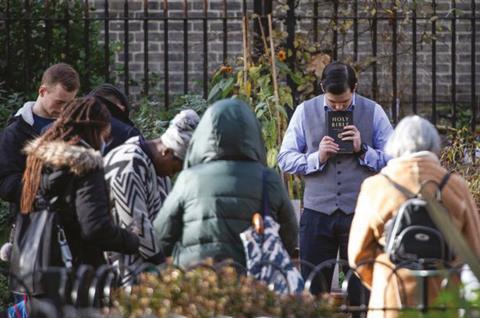
In November 2020, Pastor Regan King chose to break England’s lockdown rules, which prevented in-person church services from taking place. You don’t have to agree with his specific actions to appreciate his logic in general.
He told Premier Christianity that The Angel Church in Islington would continue to hold services. “We’re called to love God, and love our neighbour. So we have to consider when God’s teaching and commands diverge from government. Consistently the example in the Bible we see…we must obey God rather than men because his ways are fully righteous and just.”
At the time, government guidance stated that serious breaches and failure to comply with enforcement notices could result in costly fines and even imprisonment for up to two years. Pastor King said he would be willing to pay this cost: “It’s not done in a spirit of anger. It’s not done in a spirit of insubordination, but with respect and a recognition that, while there may be costs – we may at some point be fined – suffering for doing good is a blessed thing.”













